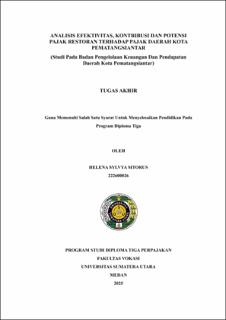| dc.contributor.advisor | Thamrin, Muhammad Husni | |
| dc.contributor.author | Sitorus, Helena Sylvya | |
| dc.date.accessioned | 2025-06-11T03:38:42Z | |
| dc.date.available | 2025-06-11T03:38:42Z | |
| dc.date.issued | 2025 | |
| dc.identifier.uri | https://repositori.usu.ac.id/handle/123456789/104290 | |
| dc.description.abstract | Restaurant tax is one of the main components in the regional tax structure which has a strategic role in supporting the financing of development and the delivery of public services in the Pematangsiantar City. The rapid development of the tourism industry and the culinary business in this area also encourages an increase in potential revenue from the taxation sector. However, the actual achievements in tax collection restaurants still have not reached an optimal level, which is reflected in its relatively small contribution to total local tax revenue.
The purpose of this study is to analyze the level of effectiveness and contribution of restaurant tax to the regional tax revenue of Pematangsiantar City during the period 2020-2023, project the potential revenue of restaurant tax in 2024, and identify various inhibiting factors and government efforts in increasing restaurant tax realization.
This research uses a descriptive qualitative method with a case study at the Regional Financial and Income Management Board of Pematangsiantar City. Data were collected through interviews, observation, documentation studies, and analysis of primary and secondary data. Data analysis techniques include data reduction, data presentation, and conclusion drawing to answer research questions.
The results revealed that during the period 2020-2023, restaurant tax realization showed very effective performance with an average achievement of 108.54% of the target. However, its contribution to total local tax revenue is still relatively insufficient with an average contribution of 13%. The projected revenue potential in 2024 reaches Rp18.06 billion. Some of the main challenges include low taxpayer awareness and limited supervisory capacity, while improvement efforts are focused on implementation of tapping box technology, education programs, and synergy across agencies. The results of this study can be used as a basis for consideration in developing policies to strengthen local revenue. | en_US |
| dc.language.iso | id | en_US |
| dc.publisher | Universitas Sumatera Utara | en_US |
| dc.subject | Effectiveness | en_US |
| dc.subject | Contribution | en_US |
| dc.subject | Potential | en_US |
| dc.subject | Restaurant Tax | en_US |
| dc.subject | Regional Taxes | en_US |
| dc.title | Analisis Efektivitas, Kontribusi dan Potensi Pajak Restoran terhadap Pajak Daerah Kota Pematangsiantar (Studi pada Badan Pengelolaan Keuangan dan Pendapatan Daerah Kota Pematangsiantar) | en_US |
| dc.title.alternative | Analysis of the Effectiveness, Contribution and Potential of Restaurant Tax on Regional Taxes in Pematangsiantar City (Study at Regional Financial and Income Management Board of Pematangsiantar City) | en_US |
| dc.type | Thesis | en_US |
| dc.identifier.nim | NIM222600026 | |
| dc.identifier.nidn | NIDN0008016402 | |
| dc.identifier.kodeprodi | KODEPRODI62402#Perpajakan | |
| dc.description.pages | 115 Pages | en_US |
| dc.description.type | Kertas Karya Diploma | en_US |
| dc.subject.sdgs | SDGs 4. Quality Education | en_US |


